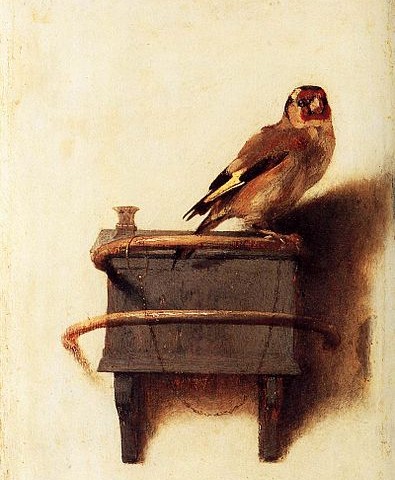When I originally bought my copy of The Goldfinch, it was February. It was an impulse buy in the middle of the night while I was dealing with migraines and panicking that I wouldn’t be able to sleep and that the lack of sleep would result in more migraines. After seeing it recommended on Amazon and everywhere, I gave the first 10% a read, liked what I saw, and went in for the buy.
After that, those same migraines made it hard to read at all. Then I had my own edits to do, rereading of older manuscripts and other things to do. I picked it back up a couple of weeks ago.
Between then and now, it won the Pulitzer Prize, which I didn’t even realize until I was talking about it to a friend on Facebook last night. “Oh, it won the Pulitzer. That’s…a little surprising.”
Not that I’m a literary snob, in particular. I’d even commented to my mother last week that I enjoyed the style of the writing. There are few things I enjoy more than zinging through a story, engrossed, floating on top of the words that paint vivid images without affectations.
But also, it’s not like I avoid literature. It started with a copy of Angela’s Ashes, picked up out of boredom in a take one/leave one library inside of a sandwich shop where I was waiting for my tires to be rotated. I didn’t expect to really like it, but none of the other books looked interesting and I figured I may as well try and be cultured.
Wow. It was the story and the words. Just beautifully written and realized. It was the first time where I really understood why someone would want to give a prize to a writer. Then, it was The Brief Wondrous Life of Oscar Wao. It was in a discount bin and I thought it sounded interesting and wow, it really was. Just this wonderful combination of contemporary themes and the history of the Dominican Republic. I still think about it now.
I read Franzen’s Freedom, but didn’t like it nearly as well as The Corrections
, which was such a darkly comedic story. I found Freedom
forgettable, other than that dude’s hatred of cats. It didn’t set me into fits of giggles like The Corrections
, which a coworker had given me, apparently knowing me better than I know myself, because it wasn’t a book I would’ve picked for myself.
And finally, Middlesex. Wow, what an incredible story. So beautifully conversational, personal, epic in that it started with grandparents and the sweeping start of the Turks invading a Greek town. Questions of sexuality, of gender, of identity and nature to nurture. It was…well, the name of the story is both pun and location. There are just so many clever twists, so much interesting history, flowing through time and place in several ages. It’s beautiful.
Oh! And just as I was thinking that it evoked some of the same eye-opening feelings that The Color Purple did for me when I was a teenager, I looked it up and yeah, that won, too. So maybe I’m more of a snob than I thought.
Anyway, why was I so surprised that a book I liked so well, like The Goldfinch, won a Pultizer?
I don’t really know. I thought, at first, there was a salaciousness to the content. I mean, it is pretty soapy. There are twists and turns, not always well communicated, but plausible enough. But I suppose it has a quality of popular fiction and the prose, while clear and well-written, wasn’t necessarily profound. But then I think, “Did Middlesex reinvent the wheel when it comes to language? The Brief Wondrous Life of Oscar Wao
?” It’s hard to compare such disparate stories. All opinions would be particularly subjective.
Interestingly, when I went to look up when the Pulitzer Prize was awarded, I saw a Vanity Fair article about the backlash the author of The Goldfinch was experiencing.
I also saw that the producers of The Hunger Games movies had optioned The Goldfinch for TV or movie development. That reminded me of what it was about the book that had captured me. It is cinematic, like an indie film or something directed by David Fincher (okay, maybe I just think it would be too precious for David Fincher to direct The Goldfinch
because I trade in dad jokes.)
It did start me thinking, not just about literature, but about our cultural need to not celebrate success, but to instinctively tear it down. After reading the VF article, while I can see what they are saying, and while it’s not too far away from my own initial thoughts, I would definitely stop short of calling The Goldfinch the end of literature.
Because the thing is, I didn’t just list those books I read to show off that I can read real good, but because the truth is, whether those books won anything or not is immaterial. The more important connection between those books is that they’re damn entertaining. That’s all any of us who put together a story are trying to be.
p.s. The one Pulitzer Prize winning book that I really didn’t care for (other than Freedom which I didn’t hate, I was just lukewarm) was The Amazing Adventures of Kavalier and Klay. I found it predictable and plodding, far too impressed with its own cleverness. Funnily, it was the one I thought I’d like best since it was about comic books.

